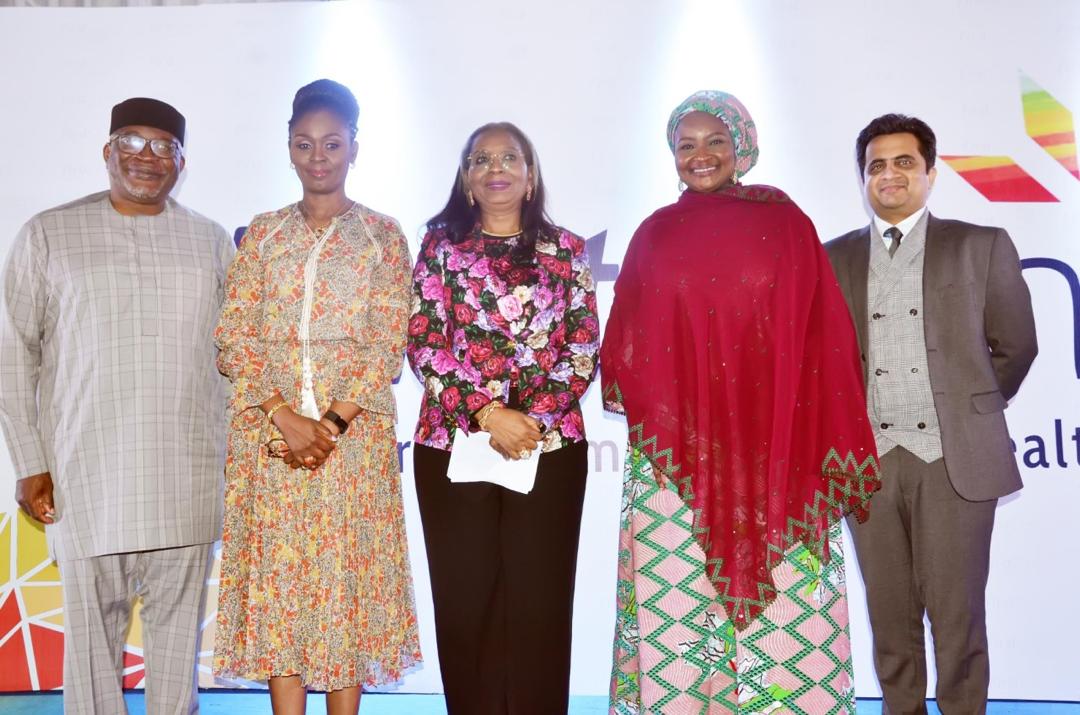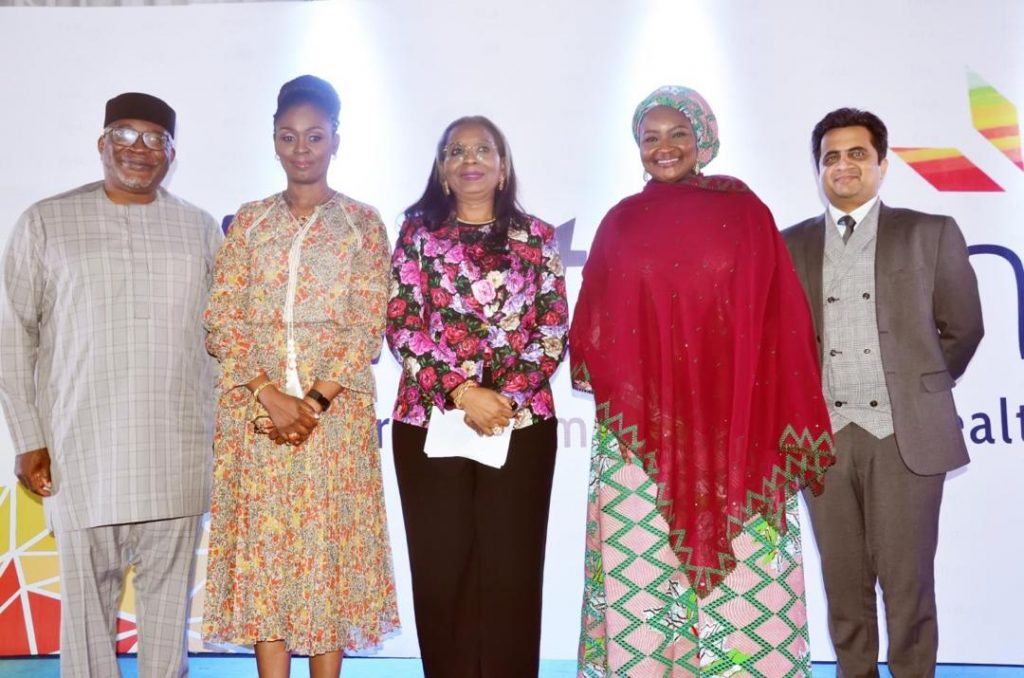Business
FIRSTBANK: EMPOWERING WOMEN THROUGH FINANCIAL INCLUSION

First Bank of Nigeria Limited is taking steps to ensure that women and women-led businesses are empowered. The bank has, through its FirstGem; FirstMonie and First Women Network empowered and brought several unbanked women into the financial system. This it proved during this year’s International Women’s Day (IWD) celebration, writes COLLINS NWEZE.
Empowering women through improved access to finance and social support are crucial in achieving the desired growth for the economy. This is the belief of First Bank of Nigeria Limited, even as it maintained that investing in women’s economic empowerment sets a direct path towards gender equality, poverty eradication and inclusive economic growth.
It acknowledges the enormous contributions made by women, whether as business women, farmers, entrepreneurs or employees, or by doing unpaid care work at home.
This it demonstrated during this year’s International Women’s Day (IWD), a worldwide event that celebrates women’s achievements – from the political to the social. It is also a day that stakeholders in Nigeria and in the Diaspora canvassed gender equality in society and workplace.
The event brings together governments, women’s organisations, corporations and charities for purposes of development and inclusion.
According to the World Bank, women empowerment is the process that creates power in individuals over their own lives, society and in their communities.
Women’s empowerment is all about equipping and allowing them to make life-determining decisions through the different problems in society.
Also, empowering women by granting them access to vast opportunities and information will not only lead to personal development for them but also the development of the communities and societies they operate in.
First Bank is, therefore, supporting women’s economic empowerment through FirstGem, which gives them economic voice and bring many unbanked women to the financial system.
The bank has advanced N58 billion loans to over 81,000 women-led businesses and interests. Besides, 44,356 women (corporate and individual, including members of staff of the bank) currently own and operate the FirstGem account with a seating balance of N2.4 billion.
Also, the Agent Banking platform – which the bank leads in the industry – has promoted not just the financial inclusion of women but also independence as there are many women among its Agent Banking. Data showed that there are 38,185 male banking agents, and 11,762 female banking agents.
First Bank Managing Director/CEO Adesola Kazeem Adeduntan, said women-led businesses constitute a large part of the banks’ balance sheets and stream of income, even as he added that the bank will continue to give priority to issues that affect women.
He said the bank is also in tune with the Nigerian Sustainable Banking Principles (NSBP) which requires that companies promote gender equality in workplace.
To support the NSBP project and give women voice in the workplace, FirstBank boss said women remain some of the best workforces and always make great impact in establishments.
FirstBank believes that women needed to be economically empowered. Unless social concerns such as gender disparity and women economic empowerment are addressed, economic and environmental goals and overall sustainable development will be difficult to achieve.
Adeduntan said the introduction of FirstGem, a female-focused product by the bank has contributed to the development of the Nigerian economy.
Speaking at the FirstGem third anniversary conference held in Lagos, the bank chief said he was delighted that FirstGem is promoting savings culture, financial literacy, loan management, wealth creation and healthy lifestyle for women.
Adeduntan said the product has a wide array of advisory, health and current awareness services for the discerning woman.
He said: “On October 28, 2016 we launched this women-centric account, designed specifically to meet the financial needs of both corporate and entrepreneurial women. This product, apart from being an account dedicated solely to women, is lifestyle-enhancing.
“It provides a total lifestyle support for discerning women to enable them to meet their economic needs and aspirations. It goes without saying that economic stability does impact overall stability of individuals, institutions, communities and nations.
“With FirstGem, therefore, our long-term focus is on national economic development. I believe that with the indices we have so far, FirstGem is on the right performance track.”
In sports, the Female Basketball team, Elephant Girls, have, over the years, dominated the Women Basketball League of the Nigeria Basketball Federation, representing Nigeria in the International Basketball Federation (FIBA) Africa Women’s Champions.
According to FirstBank, Corporate Responsibility and Sustainability (CR&S) involves meeting the needs of our stakeholders now and in the future. Our CR&S approach is three-pronged: citizenship, stakeholder management and impact management.
“Citizenship and stakeholder management involves putting into consideration the needs of stakeholders in making decisions, while impact management is basically about minimising our negative impacts and increasing our positive impacts on society.
“FirstBank prides itself in being an equal opportunity employer and have integrated diversity and inclusion policies and awareness into its practices.
The bank said its efforts at engendering diversity in the workplace include having in place a policy that encourages inclusion. The group’s diversity and inclusion objective is to be a recognised industry leader in workforce diversity and leverage diversity for the growth of the group and the success of the customers and communities we serve. We have a male: female ratio of 61:39 across the workforce,” he said.
Also, the bank’s Board and Senior Management Teams have consistently supported women development by deliberately designing a dedicated platform called FirstGem to drive financial inclusion and all-round development of women.
The bank’s CR&S approach is designed to deliver value in a structured way in the areas of education, health and welfare; financial inclusion; responsible lending and procurement.
Inclusivity ties in with our people empowerment goal which includes improving the lives of our stakeholders through the bank’s agenda of nation-building by empowering women and girls to access the opportunities and societal benefits to grow and advance societal and economic benefits. The bank is committed to promoting diversity, inclusion through our products, services and programmes.
Advancing the FirstGem vision
FirstBank explained that in recognition of the impact of women’s contribution to economic development, the bank is steadily advancing the vision of FirstGem through active and value-adding participation in many women empowerment programmes, international conferences, seminars, workshops, and roadshows across different cities and states of Nigeria over the past couple of years.
It revealed that at the forefront of these engagements is the Chairman of Board of Directors of the Bank who happens to be a female.
It said the bank is committed to maintaining a positive work environment and to conducting business in a positive, professional manner by consistently ensuring equal employment opportunity.
FirstBank Women Network is aimed at addressing the gender gap at the senior levels and taps the opportunities presented by enabling our women to contribute even more if given the necessary strategic support and an enabling environment. This includes providing a platform that enables women to become more engaged in their workplace, set and achieve goals, have greater influence in their lives and achieve more of their potential.
The initiative was launched with the International Women’s day (IWD) celebration that held on March 8, 2018 with the theme #PressforProgress.
Also, the First Women Network is built around six pillars which are influence career pipeline, networking opportunities, grooming, etiquette and poise, mentoring, coaching and sponsorship opportunities, counselling, support and welfare, financial planning and empowerment.
Coaching/mentoring scheme
FirstBank has a coaching and mentoring scheme dedicated to female members of staff in the bank. This is to enable older female members of staff to handhold and coach the younger ones with reference to their experience as they climbed the career ladder.
For her, the types and number of products and services available to women include the facilities and polices provided to support gender diversity in the work place, among others.
Also, 2,708 female employees have special opportunities as nursing mothers: The Bank recognises that pregnancy and childbirth may take its toll on the women.
In addition to the three months’ maternity leave with pay, our practice allows for nursing mothers to resume two hours later than the normal resumption period, or close two hours earlier than the normal closing hours. This is applicable for the first three months after resumption from maternity.
All these have made the bank winner of the Nigeria Sustainable Banking Awards on Women Empowerment Category, which is driven by the Central Bank of Nigeria, among other laurels.

Business
Nigeria’s Inflation Drops to 15.10% as NBS Reports Deflationary Trend

Nigeria’s headline inflation rate declined to 15.10 per cent in January 2026, marking a significant drop from 27.61 per cent recorded in January 2025, according to the latest Consumer Price Index (CPI) report released by the National Bureau of Statistics.
The report also showed that month-on-month inflation recorded a deflationary trend of –2.88 per cent, representing a 3.42 percentage-point decrease compared to December 2025. Analysts say the development signals easing price pressures across key sectors of the economy.
Food inflation stood at 8.89 per cent year-on-year, down from 29.63 per cent in January 2025. On a month-on-month basis, food prices declined by 6.02 per cent, reflecting lower costs in several staple commodities.
The data suggests a sustained downward trajectory in inflation over the past 12 months, pointing to improving macroeconomic stability.
The administration of President Bola Ahmed Tinubu has consistently attributed recent economic adjustments to ongoing fiscal and monetary reforms aimed at stabilising prices, boosting agricultural output, and strengthening domestic supply chains.
Economic analysts note that while the latest figures indicate progress, sustaining the downward trend will depend on continued policy discipline, exchange rate stability, and improvements in food production and distribution.
The January report provides one of the clearest indications yet that inflationary pressures, which surged in early 2025, may be moderating.
Bank
Alpha Morgan to Host 19th Economic Review Webinar

Alpha Morgan to Host 19th Economic Review Webinar
In an economy shaped by constant shifts, the edge often belongs to those with the right information.
On Wednesday, February 25, 2026, Alpha Morgan Bank will host the 19th edition of its Economic Review Webinar, a high-level thought leadership session designed to equip businesses, investors, and individuals with timely financial and economic insight.
The session, which will hold live on Zoom at 10:00am WAT and will feature economist Bismarck Rewane, who will examine the key signals influencing Nigeria’s economic direction in 2026, including policy trends, market movements, and global developments shaping the local landscape.
With a consistent track record of delivering clarity in uncertain times, the Alpha Morgan Economic Review continues to provide practical context for decision-making in a dynamic environment.
Registration for the 19th Alpha Morgan Economic Review is free and can be completed via https://bit.ly/registeramerseries19
It is a bi-monthly platform that is open to the public and is held virtually.
Visit www.alphamorganbank to know more.
Business
GTBank Launches Quick Airtime Loan at 2.95%

GTBank Launches Quick Airtime Loan at 2.95%
Guaranty Trust Bank Ltd (GTBank), the flagship banking franchise of GTCO Plc, Africa’s leading financial services group, today announced the launch of Quick Airtime Loan, an innovative digital solution that gives customers instant access to airtime when they run out of call credit and have limited funds in their bank accounts, ensuring customers can stay connected when it matters most.
In today’s always-on world, running out of airtime is more than a minor inconvenience. It can mean missed opportunities, disrupted plans, and lost connections, often at the very moment when funds are tight, and options are limited. Quick Airtime Loan was created to solve this problem, offering customers instant access to airtime on credit, directly from their bank. With Quick Airtime Loan, eligible GTBank customers can access from ₦100 and up to ₦10,000 by dialing *737*90#. Available across all major mobile networks in Nigeria, the service will soon expand to include data loans, further strengthening its proposition as a reliable on-demand platform.
For years, the airtime credit market has been dominated by Telcos, where charges for this service are at 15%. GTBank is now changing the narrative by offering a customer-centric, bank-led digital alternative priced at 2.95%. Built on transparency, convenience and affordability, Quick Airtime Loan has the potential to broaden access to airtime, deliver meaningful cost savings for millions of Nigerians, and redefine how financial services show up in everyday life, not just in banking moments.
Commenting on the product launch, Miriam Olusanya, Managing Director of Guaranty Trust Bank Ltd, said: “Quick Airtime Loan reflects GTBank’s continued focus on delivering digital solutions that are relevant, accessible, and built around real customer needs. The solution underscores the power of a connected financial ecosystem, combining GTBank’s digital reach and lending expertise with the capabilities of HabariPay to deliver a smooth, end-to-end experience. By leveraging unique strengths across the Group, we are able to accelerate innovation, strengthen execution, and deliver a more integrated customer experience across all our service channels.”
Importantly, Quick Airtime Loan highlights GTCO’s evolution as a fully diversified financial services group. Leveraging HabariPay’s Squad, the solution reinforces the Group’s ecosystem proposition by bringing together banking, payment technology, and digital channels to deliver intuitive, one-stop experiences for customers.
With this new product launch, Guaranty Trust Bank is extending its legacy of pioneering digital-first solutions that have redefined customer access to financial services across the industry, building on the proven strength of its widely adopted QuickCredit offering and the convenience of the Bank’s iconic *737# USSD Banking platform.
About Guaranty Trust Bank
Guaranty Trust Bank (GTBank) is the flagship banking franchise of GTCO Plc, a leading financial services group with a strong presence across Africa and the United Kingdom. The Bank is widely recognized for its leadership in digital banking, customer experience, and innovative financial solutions that deliver value to individuals, businesses, and communities.
About HabariPay
HabariPay is the payments fintech subsidiary of GTCO Plc, focused on enabling fast, secure, and accessible digital payments for individuals and businesses. By integrating payments and digital technology, HabariPay supports innovative services that make everyday financial interactions simpler and more seamless.
Enquiries:
GTCO
Group Corporate Communication
[email protected]
+234-1-2715227
www.gtcoplc.com
-

 celebrity radar - gossips6 months ago
celebrity radar - gossips6 months agoWhy Babangida’s Hilltop Home Became Nigeria’s Political “Mecca”
-

 society6 months ago
society6 months agoPower is a Loan, Not a Possession: The Sacred Duty of Planting People
-

 society5 months ago
society5 months agoReligion: Africa’s Oldest Weapon of Enslavement and the Forgotten Truth
-

 news6 months ago
news6 months agoTHE APPOINTMENT OF WASIU AYINDE BY THE FEDERAL GOVERNMENT AS AN AMBASSADOR SOUNDS EMBARRASSING









